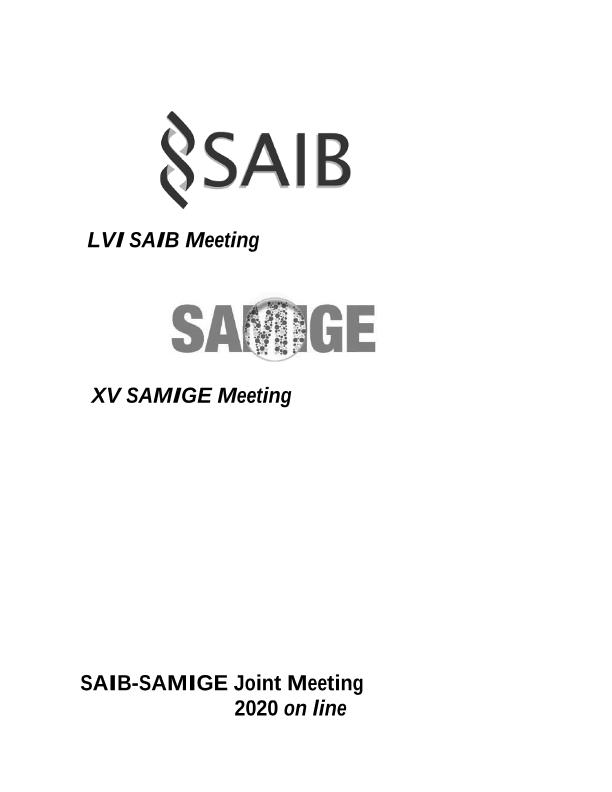Evento
Proteomic and physiological characterization of copper effect on quorum sensing regulation in Pseudomonas capeferrum
Leguina, Ana Carolina del Valle ; Lacosegliaz, Mariano José
; Lacosegliaz, Mariano José ; Fernández, Pablo Marcelo
; Fernández, Pablo Marcelo ; Castellanos, Lucia Ines
; Castellanos, Lucia Ines ; Nieto Peñalver, Carlos Gabriel
; Nieto Peñalver, Carlos Gabriel
 ; Lacosegliaz, Mariano José
; Lacosegliaz, Mariano José ; Fernández, Pablo Marcelo
; Fernández, Pablo Marcelo ; Castellanos, Lucia Ines
; Castellanos, Lucia Ines ; Nieto Peñalver, Carlos Gabriel
; Nieto Peñalver, Carlos Gabriel
Tipo del evento:
Reunión
Nombre del evento:
LVI Annual Meeting Argentine Society for Biochemistry and Molecular Biology and XV Annual Meeting Argentinean Society for General Microbiology
Fecha del evento:
02/11/2020
Institución Organizadora:
Sociedad Argentina de Investigación Bioquímica y Biología;
Sociedad Argentina de Microbiología General;
Título de la revista:
Biocell
Editorial:
Tech Science Press
Idioma:
Inglés
Clasificación temática:
Resumen
Copper has largely been used for the control of phytopathogen fungi in agriculture, even though to its non-degradability, it tends to accumulate in soils reaching prejudicial levels for soil microorganisms, including rhizomicroorganisms. The rhizosphere is characterized by intense and complex interactions that take place in it. Many of these intra- and interspecies interactions occur through quorum sensing (QS) systems. QS is a cell-to-cell signaling mechanism that control the microbial physiology in a population density manner. Several soil bacteria use QS circuits to regulate important phenotypes. In this work we studied the influence of copper on QS regulation in the plant growth-promoting rhizobacterium (PGPR) Pseudomonas capeferrum WCS358. Firstly, the QS system of the bacterium was inactivated using a quorum quenching strategy. Secondly, intracellular proteins of Ps. capeferrum WCS358 QS+ and QS-, cultured in the presence or absence of copper, were analyzed using liquid chromatography coupled to mass spectrometry. Furthermore, the effects of copper and QS on other activities such us motility, biofilm production and oxidative stress response were also evaluated in Ps. capeferrum WCS358. The QS activity and the presence of metal modified the relative abundance of proteins involved in amino acid and carbohydrate metabolism, oxidative stress defense and nutrient absorption. Besides, results indicated that QS system is implicated in the regulation of motility, biofilm production and oxidative stress response in Ps. capeferrum WCS358 and that copper had a negative effect on these activities. The results presented in this work indicate that QS regulates important traits in Ps. capeferrum WCS358 and that contamination with copper could be detrimental for the QS-dependent phenotypes in this rhizobacterium. Since the modifications observed are related to activities that are significant for the survival and fitness of bacteria, they suggest that QS may confer a competitive advantage to Ps. capeferrum WCS358 and that copper could alter the competence of this PGPR in its natural niche.
Palabras clave:
QUORUM SENSING
,
COPPER
,
INTERACTIONS
,
RHIZOSPHERE
Archivos asociados
Licencia
Identificadores
Colecciones
Eventos(PROIMI)
Eventos de PLANTA PILOTO DE PROC.IND.MICROBIOLOGICOS (I)
Eventos de PLANTA PILOTO DE PROC.IND.MICROBIOLOGICOS (I)
Citación
Proteomic and physiological characterization of copper effect on quorum sensing regulation in Pseudomonas capeferrum; LVI Annual Meeting Argentine Society for Biochemistry and Molecular Biology and XV Annual Meeting Argentinean Society for General Microbiology; Ciudad Autónoma de Buenos Aires; Argentina; 2020; 1-3
Compartir



